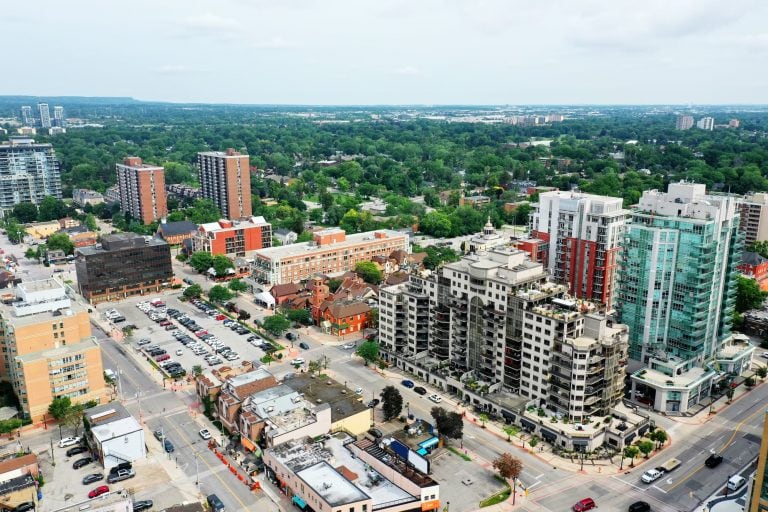Do condos lose value over time?
Short answer: no.
Long answer: Condo values appreciate at a steady rate comparable to that of traditional single-family homes. Though they also fluctuate with single-family home prices, condo values rise over time despite booms or busts. The question you should ask yourself then, when you’re thinking about buying a condo for sale in Toronto or anywhere else, shouldn’t be “will this lose value over time?”
Instead, you should be thinking: “how much money will this save me over time?” Because you shouldn’t think of condos as investments like you would of single-family homes. Instead, think of condos as short-term stepping stones between houses or as that final financial launchpad into single-family homeownership.
If condos don’t lose value over time where did the stigma that condos are not as good as an investment as a single-family home? In some markets in North America, when the real estate market goes down, the condos in that market seem to have their values affected disproportionately. These markets typically still have plenty of space and prices are such that buyers could choose a single-family home just as easily as the condo.
Additionally, condos are impacted by their building and its upkeep. Should the building start to fall into disrepair, the resident’s value will be affected. However, in metro cities like Toronto or Los Angeles, where housing space is premium, condo values mirror single-family homes.
Though both condos and single-family homes both appreciate over time, that’s really where the comparison ought to stop.
The Problem Of Comparing Condos to Single-Family Houses
Anyone telling you that condos are a good investment will also probably mention how much cheaper condos are compared to traditional detached homes. But an asset being cheaper isn’t a sign that it’s a good investment for you; it’s a sign of your limited ability to invest in general.
You can’t think of condos as just “cheaper versions” of single-family homes. You need to come at them with different mindsets. The major difference between a condo and a single-family home is this:
A condo will save you money long-term; a single-family home will make you money long-term.
Why do condos appreciate?
They’re cheaper than available single-family homes, making a robust market for condos for first time home buyers.
In housing markets like Toronto, where condos for sale are found on every major street in the city (both downtown and even out in the suburbs), 90% of those condos are full of people wanting to buy a single-family home in the surrounding area neighbourhoods. The problem they have is that they just don’t have enough equity yet to buy a single-family home.
Instead, they buy a condo because they have to live somewhere and it’s better than renting. They’ll build up decent equity with their condo, letting it appreciate year over year, but not expecting any major profit from selling their condo. Because buying a condo isn’t a money-making decision, it’s a cost-saving decision.
Most of these people rely more on their income from their jobs than their property to build up equity to buy that future house. Condos are the cheaper, smarter option, especially when compared to renting, but never when compared to owning and benefitting from a single-family home.
Condos are a good investment when you’re saving up money for a single-family house later on. The money you’d spend on renting instead goes to mortgaging a condo that will be just as nice as any rented apartment and an investment that you’ll at the very least break even on.
They’re convenient.
The camp of people who live in condos permanently (i.e. they don’t want to buy a house) usually do so for this reason. Condos are great for those looking to live close to the action in a city. You’re not going to find many green front lawns in downtown Toronto, but you will find lots of condo towers, and it’s condos like these that actually are a good investment depending on your lifestyle.
As with all of the real estate, the tired old cliché of “location, location, location” still applies to condos. If you’re looking to buy or rent out a downtown condo, then you’re making the right decision. There are always people who want to live downtown, so you can rest assured knowing that the demand will ensure that your condo does not lose value over time.
Unless you’re downtown, though, you’d be better off investing in a single-family home.
They’re great short-term options.
If you’re sick of sinking thousands of dollars annually into renting but you don’t want to stay in the same place for more than a few years, a condo is a good housing option. With a condo, you won’t be locked into a 30-year mortgage like you might be with a house, and you won’t be locked into shelling out $2,000 in rent and seeing no return for it when you decide to move away.
Alternatively, if you know you want to stay long-term in the area you’re living in, but you can’t afford a single-family home yet, buying a condo is also a very good idea. It’ll get your feet wet in terms of investment experience. It will help you build more equity for when you do want to buy that single-family home, and it will help bolster your credit and real estate contacts within the area.
How Condos Help The Single-Family Housing Market
Condos are some of the best property types out there today for one crucial reason: they are the reason that younger generations are going to be able to afford ever-increasing single-family homes in major cities.
Think of condos like the minor leagues of homeownership. Baseball players get comfortable playing professionally in the minor leagues, they get used to the rigours of the game played at that level. Similarly, condo-owners become acquainted with paying mortgages which, for younger people, is usually their first experience with those types of loans.
They get used to the homeowner mindset and vocabulary. After building up equity in their townhome and, presumably, saving some of their income, after five years or so, they could easily sell their condo and move into a house that they couldn’t afford five years ago.
Let’s tie it all back. What Keeps Condos From Losing Value Over Time?
Supply and demand, namely single-family housing supply and demand.
In so many North American cities, demand for housing far outpaces supply. We just can’t build single-family homes fast enough. On the other hand, condos are easy to build, and they’re easy to build en masse.
New homeowners moving to a city like Toronto will most likely be priced out of the single-family market, due mostly to supply problems. Instead of buying a house, they’ll use their equity to compete for the condos available in that city, driving those prices up in the process, though not nearly as high as single-family home prices.
We mean to demonstrate here that condo values are inextricably tied to single-family home prices and supply. The only thing that could cause condos to depreciate long term, barring natural disasters, are either
- The single-family home supply drastically increases
- Immigration to the city decreases
- Single-family home values decrease
It’s impossible to predict any of those three events occurring in any city with any accuracy, mostly because they are highly unlikely to occur. The unlikeliness of condos depreciating helps in large part to explain why they appreciate at all. Though condos are cheaper, they aren’t as desirable for the majority of the homebuying demographic. Still, there aren’t enough houses to satiate the demand, so people will always turn to condos as a lesser-alternative either short-term or long-term.













